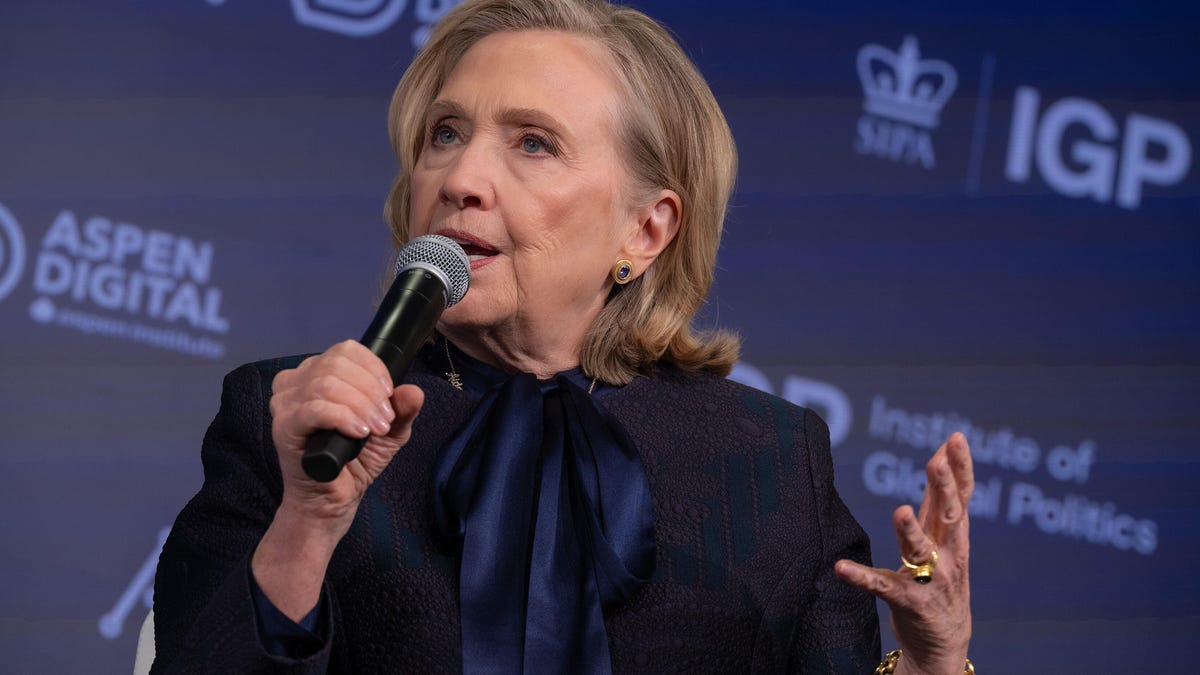AI Will Boost the Threat of Election Disinformation, Hillary Clinton Says
Though online disinformation is nothing new, artificial intelligence could take it to frightening new levels, the former secretary of state says.

Former Secretary of State Hillary Clinton talks AI and election disinformation during a panel at Columbia University in New York City.
Online disinformation operations bent on disrupting US elections aren't a new thing. Hillary Clinton had to deal with Russia's internet-based attempts to attack and discredit her when she ran for president back in 2016.
But a lot has changed in the years since. Foreign adversaries, including Russia, are still targeting American candidates, as well as the US system of democracy as a whole, but now they have the power of artificial intelligence to make their campaigns bigger, more sophisticated and more convincing than ever before.
The advancement of artificial intelligence over the past several years has made it easier for people to generate convincing phishing emails and deepfakes. As AI tools like OpenAI's ChatGPT, Google's Gemini and Microsoft's Copilot compete for market share, they're continually developing new capabilities, all of which come with the risk of abuse.
"I think that anybody who's not worried is not paying attention," said Clinton, who served as secretary of state and a US senator before her presidential run.
Clinton made the comments Thursday during a panel discussion at an event focused on AI's impact on 2024 global elections. Held at Columbia University in New York City, the event was jointly sponsored by think tank Aspen Digital and the Institute of Global Politics at Columbia's School of International and Public Affairs.
During the event, Clinton and other panelists spoke about the need for government and tech companies, especially those in social media, to work together to combat the spread of disinformation and misinfomation. They also noted how disinformation campaigns often target women, pushing an already underrepresented population out of politics.
"We see women disappearing from public space," said Věra Jourová, vice president for values and transparency for the European Commission, the executive arm of the European Union.
Political parties around the world are eager to recruit women to run for office, because they know it's a good way to attract voters, Jourová said.
"But then when women become politicians, the same political parties aren't honest enough and courageous enough to defend them," she said.
Election security has been a major topic for the past two presidential elections. Much was made during the 2016 election about the possibility that a foreign government, such as Russia's, could "hack" the election, either changing results and winners without anyone knowing or changing them to be so obviously improbable that it would destroy trust in the system.
But little evidence of meddling was found, and over the next four years many states that had been using the kinds of voting technology that experts were worried about replaced it and shored up their systems.
There were worries about a potential hacking ahead of the 2020 election, but officials found no evidence of any kind of widespread election fraud. Chris Krebs, then the director of the Cybersecurity and Infrastructure Security Agency, the federal agency charged with protecting the nation's critical infrastructure from cyberthreats, declared the 2020 vote the "most secure election" in American history.
The worry expressed by the panel is that AI could substantially ramp up those threats. And it's already happening. Ahead of New Hampshire's January presidential primary, some voters in that state received apparent robocalls that used AI technology to mimic the voice of President Joe Biden and told them not to come to the poils.
While it remains to be seen just how much damage AI-powered disinformation could do ahead of this year's general election, "there's more than enough reason to be worried about what we've already seen," Clinton said.
Nothing could be more dangerous than an effort to discredit the American election system that's boosted by AI-powered deepfakes and leaves American voters not knowing what's real and what's not, former Secretary of Homeland Security Michael Chertoff said during another panel.
"It would be like pouring gasoline on a fire," he said.

